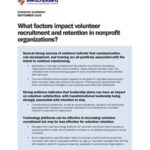Volunteering is associated with health-promoting benefits for both recipients and volunteers and may contribute to a more inclusive society. However, studies have shown a persistent pattern of social inequality among those who volunteer, and immigrants participate as volunteers less than the majority population. To date, approaches for recruiting immigrant populations have not been sufficiently examined, even though multicultural societies are becoming increasingly diverse. This study investigates how recruitment is carried out in voluntary organizations and how volunteers who are involved in recruitment reflect on the inclusion of citizens with immigrant backgrounds. Qualitative interviews were conducted with 18 volunteers and three employees with recruitment responsibility at five voluntary organizations engaged in welfare and community-related activities in a semirural district in Norway. Our findings show that different structural factors and individual aspects of the recruiter influence the recruitment of immigrants as volunteers. Large-scale organizations are more professionalized and more directed by fundings and frameworks and demand more qualifications due to their volunteer tasks. This might make inclusive recruitment more challenging. Small-scale organizations have more flexibility and less professionalized volunteer activities, making recruitment more inclusive. In addition, if the small-scale organizations are minority driven, it seems to positively influence the recruitment of immigrants through increased diversity sensitivity and more connections with immigrants through their social network.
A Systematic Review on the Impact of Trauma-Informed Education Programs on Academic and Academic-Related Functioning for Students Who Have Experienced Childhood Adversity
The purpose of this study was to conduct a systematic review of the existing literature regarding trauma-informed education programs and their impact on academic and academic-related outcomes. The articles included for review (n=15) contained data on trauma-informed education programs implemented in preschool, primary/elementary, and high school settings. Academic and academic-related outcomes reported included attendance, disciplinary…

